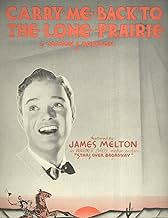Only with the demise of the musical film with the studio system did the idea of making popular stars out of opera singers finally die out. During the Thirties there was a flourish by studios to sign opera stars based on the success Grace Moore had in One Night of Love for Columbia.
Columbia made a successful opera star film, now everybody got into the act. Twentieth Century Fox signed Lily Pons, Paramount inked Gladys Swarthout, MGM had Lawrence Tibbett for awhile. Nelson Eddy made the only real transition from grand opera to Hollywood.
Anyway Warner Brothers signed Metropolitan Opera tenor James Melton and I have to say he had a very pleasant voice and a personality that was easy to take. He's a bellhop who's voice comes over into Pat O'Brien's room as down on his luck theatrical agent O'Brien is contemplating suicide. Not an uncommon thing in the Depression as people became paupers overnight at times.
The rest of the film is the trials and tribulations Melton and O'Brien go through. The song Melton sang, Carry Me Back to the Lone Prarie, a cowboy ballad became a staple item during his concerts.
Another interesting piece of trivia is that the song September in the Rain was cut from the finished film. You can hear it played in the background. It was sung in another film by James Melton called Melody for Two and became a popular hit for him.
Jane Froman is also in the film and it's interesting why she never became a film star, except really in her own autobiographical film, With a Song In My Heart where she sings with Susan Hayward lipsynching. She had the looks and the voice. Who can tell about these things.
I recommend this film highly so people can get to hear what a couple of real good singers are like from the thirties. Especially Melton. I happen to have a few recordings of him and he has an infectious lilt in his voice. The only film that's really available for people to see him in is The Ziegfeld Follies where he and Marion Bell sing an aria from La Traviata. It was a good number, but Melton did so much more than that.





































